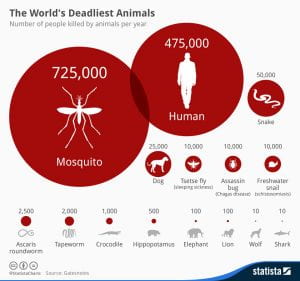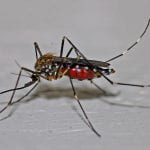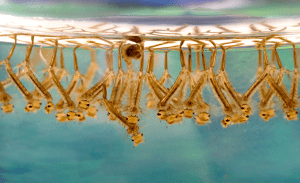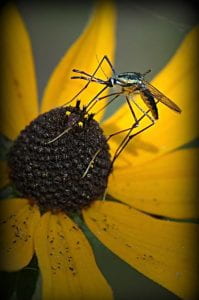By Cecille Jones, Monroe Master Gardener Volunteer
This article appeared in the August 2021 Issue of Gardening in Orange County.
 Did you know one of the smallest insects in the world also happens to be the deadliest to humans? Yup, those pesky mosquitoes renowned for ruining many an outdoor evening event kill more humans every year than sharks, snakes, lions, crocodiles, and hippos combined. Of course they don’t do it alone; mosquitoes do not actually cause diseases themselves but act as vectors (carriers) for deadly diseases such as malaria, encephalitis, dengue fever, yellow fever, West Nile virus and Zika, to name a few. To transmit these diseases, mosquitoes first need to feed on the blood of a human or other animal that is already infected by the disease. Afterwards when they bite a healthy human, they pass on the disease.
Did you know one of the smallest insects in the world also happens to be the deadliest to humans? Yup, those pesky mosquitoes renowned for ruining many an outdoor evening event kill more humans every year than sharks, snakes, lions, crocodiles, and hippos combined. Of course they don’t do it alone; mosquitoes do not actually cause diseases themselves but act as vectors (carriers) for deadly diseases such as malaria, encephalitis, dengue fever, yellow fever, West Nile virus and Zika, to name a few. To transmit these diseases, mosquitoes first need to feed on the blood of a human or other animal that is already infected by the disease. Afterwards when they bite a healthy human, they pass on the disease.

There are as many as 3,500 species of mosquitoes and they live on every continent except Antarctica. Not all mosquitoes bite, some adult mosquitoes feed exclusively flower nectar. And for the mosquitoes that do bite, less than one hundred species are carriers of horrible diseases. And it is only the female mosquitoes that take a blood meal from hosts like us. And they only do it, because they need the protein from our blood to produce their eggs.

So, what are mosquitoes good for, you ask? Mosquito larvae are an integral part of the aquatic ecosystems in which they live. Mosquito larvae that live in wetlands consume a lot of organic matter. By straining organic particles through their system and converting into their own tissue matter they help recycle nutrients back into the ecosystem. Mosquito larvae serve as an important food source for other aquatic animals such as dragonfly larva and fish. From the human point of view, mosquitoes seem to exist to annoy us or make us sick, but from the point of view of spiders, birds, bats, reptiles, amphibians, fish, and other animals that rely on them as a source of food, mosquitoes are important for survival. For example, in the Arctic tundra, birds rely on the swarms of mosquitoes to stay alive.
 Mosquitoes are beneficial to plants as well. Many adult mosquitoes depend on plant nectar for their energy, and while retrieving the nectar, they also pollinate plants. And as we know that pollination is key to plant reproduction, mosquitoes play an important role in helping plants survive so they can provide food and shelter for other organisms.
Mosquitoes are beneficial to plants as well. Many adult mosquitoes depend on plant nectar for their energy, and while retrieving the nectar, they also pollinate plants. And as we know that pollination is key to plant reproduction, mosquitoes play an important role in helping plants survive so they can provide food and shelter for other organisms.
The reality is that not enough is known about all the interspecies interactions of mosquitoes to get rid of them without doing harm to other species in our ecosystems. In the meantime, scientists are studying mosquito saliva in hopes of finding properties that can lead to the development of anti-clotting drugs that can be used to treat cardiovascular disease. Until that day arrives, we may not have a conclusive answer to the question: What are mosquitoes good for?
Learn more about mosquitoes:
VIDEO: Mosquitoes in Your Back Yard – NYS Integrated Pest Management, Cornell University
Mosquitoes – NYS Integrated Pest Management, Cornell University
Mosquitoes – Medical Entomology, Purdue University
Meet the Mosquito With a Big Appetite—for Other Mosquitoes – Entomology Today
